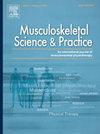The prognostic reasoning by physiotherapists of musculoskeletal disorders: A phenomenological exploratory study
IF 2.2
3区 医学
Q1 REHABILITATION
引用次数: 0
Abstract
Question(s)
What are the prognostic reasoning practices of physiotherapists towards musculoskeletal disorders?
Design
Exploratory phenomenological study.
Participants
15 physiotherapists who currently treat musculoskeletal disorders.
Date analysis
Semi-structured interviews were implemented to collect data which was analysed using an inductive coding and thematic analysis approach.
Results
Three themes were identified. First, how physiotherapists considered prognosis within clinical practice. Whilst prognosis is an important consideration, in some circumstances it either may not be considered or is implied. Second, how physiotherapists determine prognosis for musculoskeletal disorders. Several factors shaped the ability of physiotherapists to determine prognosis including how they determine prognosis, and the barriers and facilitators towards determining prognosis. Finally, how physiotherapists discuss prognosis with individuals who have a musculoskeletal disorder. These discussions were shaped by the prognostic information provided, as well as the barriers and facilitators towards discussing prognosis.
Conclusion
The prognostic reasoning of physiotherapists appears to be influenced initially by whether they consider it or not. It is then shaped by both barriers and facilitators towards determining and discussing prognosis. Facilitators for this prognostic reasoning process appear to be aligned with the biomedical model of health, whilst barriers more aligned with psychosocial factors. To improve prognostic reasoning, physiotherapists should continue to strive to conceptualize prognosis within a biopsychosocial framework. Doing so will improve the ability of physiotherapists to prognosticate, which will subsequently improve outcomes associated with musculoskeletal disorders.
肌肉骨骼疾病物理治疗师的预后推理:现象学探索性研究。
问题(5):物理治疗师对肌肉骨骼疾病的预后推理做法是什么?设计:探索性现象学研究。参与者:15名目前治疗肌肉骨骼疾病的物理治疗师。数据分析:采用半结构化访谈收集数据,并采用归纳编码和专题分析方法进行分析。结果:确定了三个主题。首先,物理治疗师在临床实践中如何考虑预后。虽然预后是一个重要的考虑因素,但在某些情况下,它可能不被考虑或被暗示。第二,物理治疗师如何确定肌肉骨骼疾病的预后。几个因素塑造了物理治疗师确定预后的能力,包括他们如何确定预后,以及确定预后的障碍和促进因素。最后,物理治疗师如何与患有肌肉骨骼疾病的个体讨论预后。这些讨论受到所提供的预后信息以及讨论预后的障碍和促进因素的影响。结论:物理治疗师的预后推理似乎最初受到他们是否考虑的影响。然后,在确定和讨论预后的过程中,它受到障碍和促进因素的影响。这一预测推理过程的促进因素似乎与健康的生物医学模型一致,而障碍则更符合社会心理因素。为了改善预后推理,物理治疗师应继续努力在生物心理社会框架内概念化预后。这样做将提高物理治疗师的预测能力,这将随后改善与肌肉骨骼疾病相关的结果。
本文章由计算机程序翻译,如有差异,请以英文原文为准。
求助全文
约1分钟内获得全文
求助全文
来源期刊

Musculoskeletal Science and Practice
Health Professions-Physical Therapy, Sports Therapy and Rehabilitation
CiteScore
4.10
自引率
8.70%
发文量
152
审稿时长
48 days
期刊介绍:
Musculoskeletal Science & Practice, international journal of musculoskeletal physiotherapy, is a peer-reviewed international journal (previously Manual Therapy), publishing high quality original research, review and Masterclass articles that contribute to improving the clinical understanding of appropriate care processes for musculoskeletal disorders. The journal publishes articles that influence or add to the body of evidence on diagnostic and therapeutic processes, patient centered care, guidelines for musculoskeletal therapeutics and theoretical models that support developments in assessment, diagnosis, clinical reasoning and interventions.
 求助内容:
求助内容: 应助结果提醒方式:
应助结果提醒方式:


